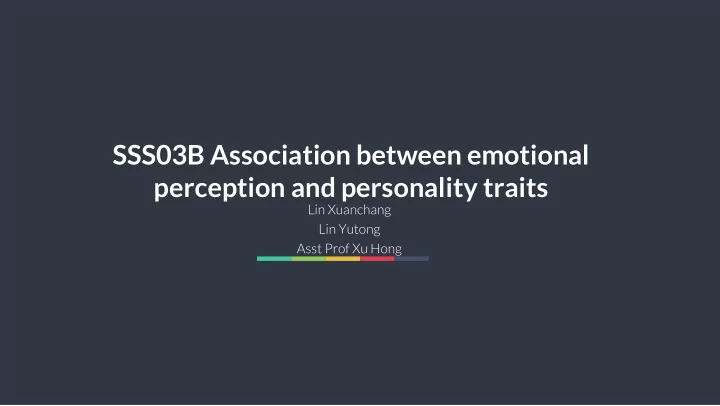

SSS03B Association between emotional perception and personality traits Lin Xuanchang Lin Yutong Asst Prof Xu Hong
What is Alexithymia? ‘No words for feelings’ ● A multifaceted, subclinical personality construct that impairs one’s ability in interpreting and describing one’s own and other’s feelings ● Close relationship with various clinical illnesses and impairments in social functioning
OUR AIMS 3 To investigate the relationship between Emotional speech & Alexithymia To observe the integration between: Emotional content & Emotional Voice Capitalist Slides
Experimental design 4 ● Ten sentences each with positive, negative or neutral valence and of similar length were produced Sentence design Capitalist Slides
Experimental design 5 ● 4 actors, two males and two females were recruited to record each sentence with happy, sad and neutral voices Voice stimulus ● 24 sentences (72 voice tracks) were used for the experiment after validation For illustration: A neutral sentence: I turned off the light in my room just now Happy voice Neutral voice Neutral voice Capitalist Slides
METHODOLOGY 6 2 4 4 1 3 24 STUDENTS AQ test Emotional TAS test Emotional VOICE CONTENT block block 3 5 4 2 Emotional AQ test TAS test Emotional content CONTENT block block Capitalist Slides
7 Rating of emotions 1 2 3 4 5 6 7 Extremely Extremely Neutral happy sad • One minute break within a block and 2 minutes break between blocks • Pilot test conducted with 3 volunteers before actual experiment Capitalist Slides
RESULTS 8 From E-Prime database Founded Since 1940 Lorem Ipsum has two main statistical methodologies are used in data analysis Capitalist Slides
9 General results Ratings increase as they hear sadder voice/content → most participants are able to identify the intended emotion of voices and contents
Emotion in VOICE 10 Capitalist Slides
Emotion in VOICE 11 Interpretation of data ● Only ratings for neutral and sad voices were affected by incongruent content → Deviant ratings were given for those recordings Capitalist Slides
Effect of Alexithymia in the Voice Task 12 Capitalist Slides
Effect of Alexithymia in the Voice Task 13 ● TAS was correlated with two ratings: SadVoiceHappyContent(r=-.491, p<0.5), and SadVoiceNeutral Content(r=-.500, p<0.5) ● Subjects with higher TAS scores tend to give lower ratings (less sad) to the sad voice when the content is incongruent (i.e. happy or neutral) → more likely to think that a sad voice is less sad when the content is not sad Capitalist Slides
Emotion in CONTENT 14 Capitalist Slides
Emotion in CONTENT 15 Interpretation of data ● Overall effect of voice emotions on content ratings result in biased responses ● Non-significant result due to the variation of voices and individual comparisons of readings Capitalist Slides
Effect of Alexithymia in the Content 16 Task Capitalist Slides
Effect of Alexithymia in the Content Task 17 ● TAS was correlated with a myriad of ratings and effects: HappyVoiceNeutralContent, HappyVoiceSadContent, NeutralVoiceSad Content, SadVoiceHappyContent and SadVoiceNeutralContent ● Higher ratings (Sadder) to happy content as well as lower ratings (less sad) to sad content when the voice and content are incongruent ● Subjects are more affected by emotion in voice when they are asked to judge the emotion of the content Capitalist Slides
Summary and discussion of results 18 Aims 1. Correlate Alexithymia and the ability to interpret emotional vocalization 2. Attribute a direct factor for impairment in perceiving emotional vocalization (whether it is emotional voice and/or emotional content that is more significant) Capitalist Slides
Summary and discussion of results 19 Content and Voice ● Most were able to correctly identify emotions ● But the ratings are affected with varied voice and/or content respectively →difficulty to evaluate voice or content independent of each other ● Effect of content on voice judgement more obvious than voice on content ● Positive voice can be more easily identified and more likely be focused in daily interactions; sad and neutral voices are not as distinctive and are more affected Capitalist Slides
Summary and discussion of results 20 Alexithymia and emotions in speech ● High alexithymic traits potentially leads to greater susceptibility to distractions from other sources of emotional information especially in the content task ● Most pronouneced when sad voice is used Capitalist Slides
Summary and discussion of results 21 Autism and emotions in speech ● Autistic Spectrum Quotient Test was used ● No correlation with any results ● Thus the difficulty in perceiving emotional vocalization is mainly contributed by alexithymia Capitalist Slides
22 Extensions ● Importance of finding effective treatment for Alexithymia ● Music as possible remedy? ● Further studies required to attribute a more direct reason Capitalist Slides
Thank you!
Recommend
More recommend